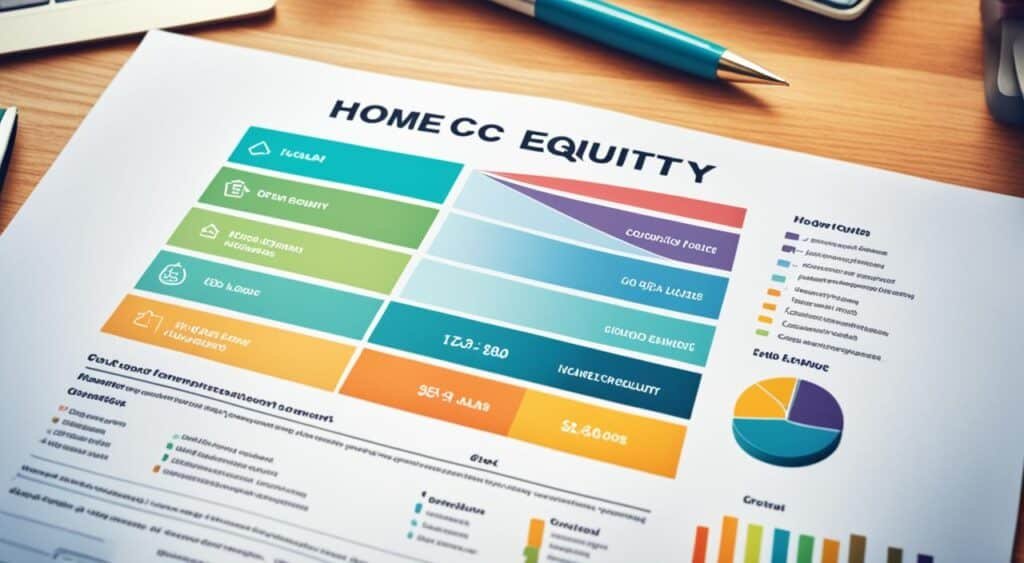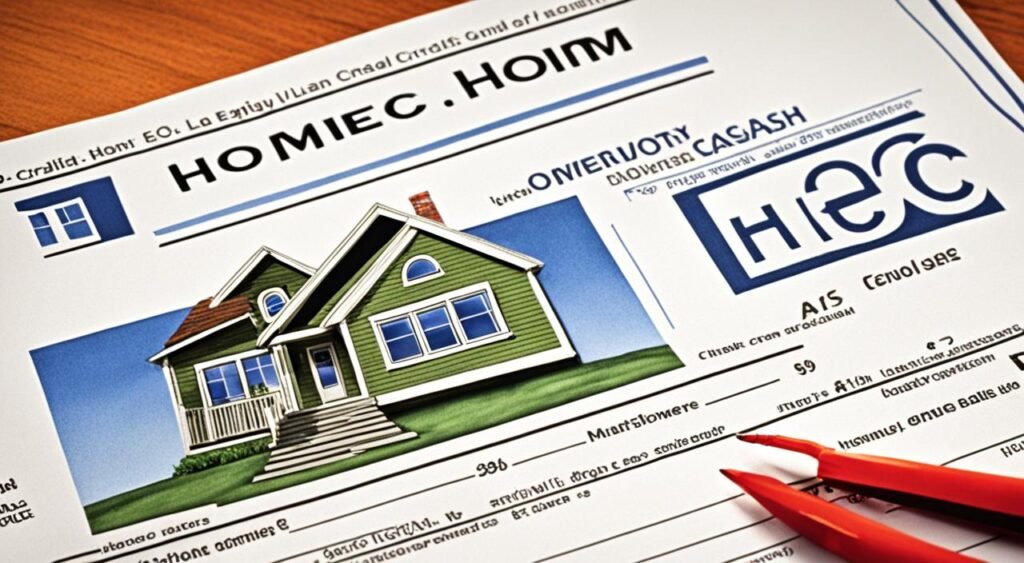Some homeowners use a home equity loan or a home equity line of credit (HELOC) for big expenses. A home equity loan gives you a lump sum by using your home’s value. On the other hand, a HELOC lets you borrow money as you need it. The main differences are in interest rates, how you pay back, and how you get the money.
Key Takeaways
- A home equity loan is a lump-sum, fixed-interest loan that uses your home’s equity as collateral.
- A HELOC is a revolving line of credit that allows you to borrow money against your home’s equity as needed.
- Home equity loans have fixed interest rates, while HELOCs have variable rates that can fluctuate over the life of the loan.
- Home equity loans typically have a set repayment term, while HELOCs have a draw period followed by a repayment period.
- Home equity loans can be used for a variety of purposes, such as home improvements, debt consolidation, or other major expenses.
Understanding Home Equity
Your home equity is the difference between your home’s market value and what you owe on your mortgage. This equity is a key asset. You can use it for things like fixing up your home, paying off debt, or for emergencies.
What is Home Equity?
When you buy a home, you usually put down a payment. This is your first equity in the property. As you pay your mortgage each month, your equity in your home grows. Plus, if your home’s value goes up, your home’s equity does too.
Factors That Affect Home Equity
Many things can change how much equity you have in your home, including:
- Mortgage payments: Every payment you make lowers your loan’s principal. This means your equity goes up.
- Home value changes: If your home’s market value goes up, so does your equity.
- Home renovations and repairs: Spending on renovations or repairs to your home can raise its value. This means more equity for you.
- Neighborhood property values: If property values in your area change, it can affect your equity.
Knowing about home equity and what affects it is key for homeowners. It helps them use this asset for their financial goals.
Home Equity Loan
A home equity loan, also known as a second mortgage, is a debt tied to your home. You can borrow up to 80% of your home’s equity. With this loan, you get a lump sum of money. These loans have a fixed interest rate and last for five, 10, or 15 years.
What is a Home Equity Loan?
A home equity loan lets you use your home’s equity for cash. Your loan’s interest rate depends on your credit scores, based on your credit reports. Lenders check your finances, like your home equity and debt-to-income ratio, to see if you can get a loan.
How Home Equity Loans Work
Getting a home equity loan means the lender checks your home’s market value. You can borrow up to 80% of that value. You get the money all at once, for things like fixing up your home, paying off debt, or buying something big.
Home Equity Loan Requirements
- Sufficient home equity (usually 20% of your home’s value)
- Good credit scores and credit history
- Stable income and a low debt-to-income ratio
- A recent home appraisal to figure out your home’s market value
Learning about home equity loans helps you decide if it’s right for your money needs.
Advantages and Disadvantages of Home Equity Loans

Home equity loans offer many benefits for homeowners needing extra cash. They often have lower interest rates than other loans. This is because your home secures the loan, making it less risky for lenders. Plus, you might be able to deduct the interest on your taxes if you use the money for home improvements.
These loans let you borrow more money because they’re secured by your home’s value. This is great for big projects like home renovations or paying off debt. It’s a way to get the funds you need for important expenses.
But, home equity loans have some downsides. The biggest risk is losing your home if you can’t pay back the loan. Also, if your home’s value drops, you might end up owing more than your house is worth. This is called being “underwater” on your mortgage.
Home equity loans also come with high closing costs. These include fees for appraisals and title searches. These costs can add up fast, so consider them when thinking about the loan’s total cost.
Advantages of Home Equity Loans:
- Lower interest rates compared to other types of loans
- Potential for tax deductions if used for home improvements
- Access to larger sums of money
- Flexibility in how the funds can be used
Disadvantages of Home Equity Loans:
- Your home is used as collateral, which can lead to foreclosure if you default on payments
- A decline in your home’s value can leave you “underwater” on the mortgage
- Hefty closing costs associated with the loan
| Advantages | Disadvantages |
|---|---|
| Lower interest rates | Home used as collateral |
| Tax deductions for home improvements | Risk of being “underwater” on the mortgage |
| Access to larger funds | Hefty closing costs |
| Flexible use of funds |
“Home equity loans can be a useful tool for homeowners, but it’s important to carefully weigh the advantages and disadvantages before making a decision.”
Home Equity Line of Credit (HELOC)

A Home Equity Line of Credit (HELOC) is a way to use your home’s equity. It’s different from a traditional loan because you can borrow money as you need it. This makes it a flexible choice for homeowners.
What is a HELOC?
A HELOC lets you use up to 80% of your home’s value, minus your mortgage balance. You can draw on this credit as needed. This means you only pay interest on what you borrow, not the whole amount.
How HELOCs Work
- During the draw period, you can use the credit as needed, usually for 10 years.
- You only pay interest on what you borrow, not the total credit line.
- After the draw period, you enter the repayment period. Here, you pay off the loan over a set time, often 20 years.
HELOC Requirements
To get a HELOC, you need to meet certain criteria. Lenders look at your home equity, credit history, and debt-to-income ratio. You usually need at least 20% equity in your home. They also check your credit reports to see if you’re a good borrower.
Understanding how a HELOC works can help homeowners see if it fits their financial plans and home equity needs.
Home Equity Loan vs HELOC

When you want to use your home’s equity, you can choose between a home equity loan or a HELOC. Both let you use your home’s value, but they work differently. It’s important to know these differences before deciding.
A home equity loan gives you a big sum of money all at once. It has a fixed interest rate. You’ll pay it back over a set time, usually 5 to 15 years. On the other hand, a HELOC lets you borrow money as you need it. It has a variable interest rate. You can borrow for 10 years and then pay it back over 20 years.
| Feature | Home Equity Loan | HELOC |
|---|---|---|
| Loan Type | Lump-sum payment | Revolving line of credit |
| Interest Rate | Fixed | Variable |
| Repayment Terms | 5-15 years | 10-year draw period, 20-year repayment period |
Choosing between a home equity loan and a HELOC depends on what you need financially. A home equity loan is good for a big expense you need right away. A HELOC is better if you want to borrow money as you go. Think about the repayment terms and interest rate structure that suit your money situation best.
Using a Home Equity Loan
A home equity loan is a flexible financial tool for homeowners. It lets people use their home’s equity for various financial needs. This can cover home improvements, debt consolidation, education costs, or big expenses.
Home equity loans are great for funding home improvement projects. You can use them for kitchen renovations, adding a new bedroom, or energy-efficient upgrades. This can boost your home’s value and make living there better.
Some homeowners use these loans to pay off high-interest debts. Combining several debts into one with a lower interest rate can save money on interest. It also makes managing your money easier.
These loans are also good for education expenses. They offer lower interest rates and flexible payback options. This makes them a better choice than other ways to finance education.
Deciding to get a home equity loan should be thoughtful. You need to look at your finances and what you want to achieve. Make sure it fits your long-term financial plans and priorities.
| Purpose | Advantages of Using a Home Equity Loan |
|---|---|
| Home Improvements | Funding for renovations, additions, or energy-efficient upgrades that can enhance the value of your property |
| Debt Consolidation | Combining high-interest debts into a single, potentially lower-interest loan to save on interest payments |
| Education Expenses | Financing educational costs, such as tuition, fees, or other related expenses, with relatively low-interest rates |
| Major Expenses | Accessing the equity in your home to fund significant purchases or financial needs |
Remember, getting a home equity loan is a big decision. It means using your home as collateral. Make sure to look into the requirements, interest rates, and repayment terms. This will help you see if it meets your financial needs and goals.
Home Equity Loan Rates

When looking into home equity loans, the interest rate is key. The rate changes based on market conditions, your credit score, the loan size, and how long you plan to borrow.
Home equity loans usually have a fixed interest rate. This means your monthly payments stay the same throughout the loan. It’s great for homeowners wanting to improve their homes, pay off debt, or reach other financial goals.
| Loan Amount | Interest Rate | Monthly Payment |
|---|---|---|
| $50,000 | 5.75% | $321.23 |
| $75,000 | 6.00% | $449.04 |
| $100,000 | 6.25% | $577.64 |
The interest rate on a home equity loan depends on your credit score, loan amount, and market conditions. Those with great credit and lots of home equity usually get lower rates. But, those with lower scores or less equity might pay more.
Homeowners should shop around for the best home equity loan rates. Knowing what affects these rates helps you make smart choices. This way, you can get the most out of a home equity loan.
Home Equity Loan Calculators

Home equity loans can seem complex, but online tools make it easier. Home equity loan calculators help homeowners figure out the loan amount, monthly payments, and interest rates. They use your home’s value and your current mortgage balance.
These calculators are great for checking if a home equity loan is right for you. Just enter your home value, existing mortgage balance, desired loan term, and interest rate. You’ll see how much you might borrow and what your monthly payment could be. This helps you decide if using your home’s equity fits your financial plans.
Starting with a home equity loan calculator is a wise move. It lets homeowners easily see their options and if a home equity loan suits their budget. With the right info, they can move forward with confidence to get the financing they need.
“A home equity loan calculator can be a valuable tool in understanding the potential costs and benefits of a home equity loan.”
Also Read: What Are The Steps To Apply For A Home Loan?
Conclusion
Home equity loans and HELOCs are great for homeowners who want to use their home’s equity. They can help with home improvements, paying off debt, or covering education costs. It’s important to look at interest rates, repayment terms, and your finances to pick the right one for you.
Think about the pros and cons of each option. A HELOC offers flexibility, while a home equity loan has fixed rates and terms. Also, consider the market, your home’s value, and your financial goals when choosing.
By understanding home equity loans and HELOCs, homeowners can make smart choices. These options can help you improve your home, pay off debt, or fund big life events. They are powerful tools for managing your finances.
FAQs
Q: What is a home equity loan and how is it different from a HELOC?
A: A home equity loan is a type of mortgage where you borrow a fixed amount of money by using the equity in your home as collateral. This loan is usually distributed in one lump sum and is paid back in fixed monthly installments with a fixed interest rate. On the other hand, a Home Equity Line of Credit (HELOC) is a revolving line of credit where you can borrow money as needed, similar to a credit card. The interest rate is usually variable and you can borrow and repay funds multiple times during a set draw period.
Q: How do I get a home equity loan?
A: To get a home equity loan, you typically need to apply for it with a lender. The lender will evaluate the value of your home, your credit score, and other financial factors to determine if you qualify for the loan. If approved, you can then receive a lump sum of money based on the available equity in your home.
Q: What can I use a home equity loan for?
A: You can use the funds from a home equity loan for a variety of purposes such as home improvements, debt consolidation, paying for education expenses, or any other personal financial need.
Q: Are home equity loans considered installment loans?
A: Yes, home equity loans are considered installment loans because they are repaid in fixed monthly installments over a set period of time with a fixed interest rate.
Q: How is the interest rate on a home equity loan determined?
A: The interest rate on a home equity loan is usually determined by several factors including your credit score, the loan amount, the loan term, and current market conditions. It is typically a fixed rate for the duration of the loan.
Q: Can I apply for a home equity loan online?
A: Yes, many lenders offer the option to apply for a home equity loan online. You can fill out an application form on the lender’s website and submit the necessary documents electronically for review.
Q: How does using your home equity affect your home loan?
A: Using your home equity can impact your home loan by potentially increasing the amount you owe on your home. It is important to consider your ability to repay the home equity loan in addition to your existing mortgage when using your home equity.
Source Links
- https://www.consumerfinance.gov/ask-cfpb/what-is-the-difference-between-a-home-equity-loan-and-a-home-equity-line-of-credit-en-247/
- https://www.bankofamerica.com/mortgage/learn/home-equity-loan-vs-line-of-credit/
- https://www.equifax.com/personal/education/loans/articles/-/learn/home-equity-loans-vs-home-equity-lines-of-credit/





